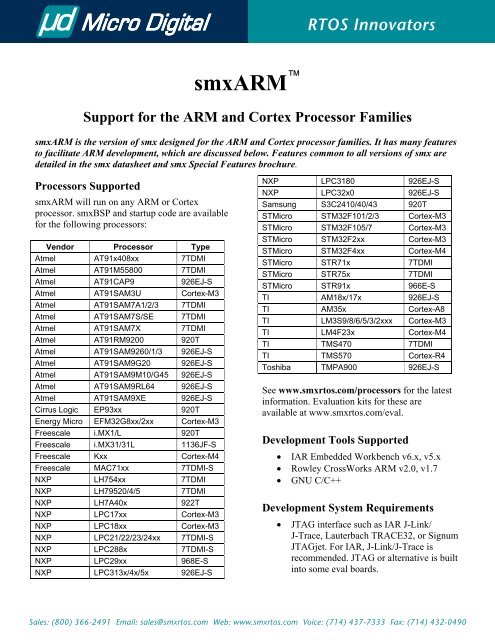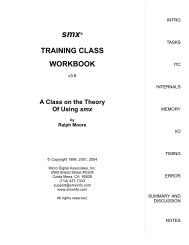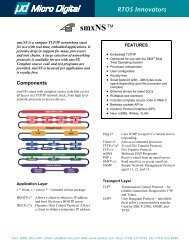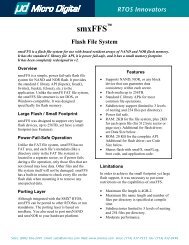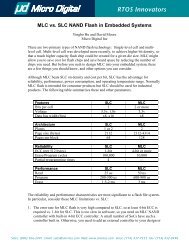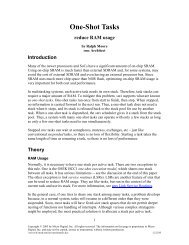PDF Version - RTOS
PDF Version - RTOS
PDF Version - RTOS
You also want an ePaper? Increase the reach of your titles
YUMPU automatically turns print PDFs into web optimized ePapers that Google loves.
<strong>RTOS</strong> Innovators<br />
smxARM <br />
Support for the ARM and Cortex Processor Families<br />
smxARM is the version of smx designed for the ARM and Cortex processor families. It has many features<br />
to facilitate ARM development, which are discussed below. Features common to all versions of smx are<br />
detailed in the smx datasheet and smx Special Features brochure.<br />
Processors Supported<br />
smxARM will run on any ARM or Cortex<br />
processor. smxBSP and startup code are available<br />
for the following processors:<br />
Vendor Processor Type<br />
Atmel AT91x408xx 7TDMI<br />
Atmel AT91M55800 7TDMI<br />
Atmel AT91CAP9 926EJ-S<br />
Atmel AT91SAM3U Cortex-M3<br />
Atmel AT91SAM7A1/2/3 7TDMI<br />
Atmel AT91SAM7S/SE 7TDMI<br />
Atmel AT91SAM7X 7TDMI<br />
Atmel AT91RM9200 920T<br />
Atmel AT91SAM9260/1/3 926EJ-S<br />
Atmel AT91SAM9G20 926EJ-S<br />
Atmel AT91SAM9M10/G45 926EJ-S<br />
Atmel AT91SAM9RL64 926EJ-S<br />
Atmel AT91SAM9XE 926EJ-S<br />
Cirrus Logic EP93xx 920T<br />
Energy Micro EFM32G8xx/2xx Cortex-M3<br />
Freescale i.MX1/L 920T<br />
Freescale i.MX31/31L 1136JF-S<br />
Freescale Kxx Cortex-M4<br />
Freescale MAC71xx 7TDMI-S<br />
NXP LH754xx 7TDMI<br />
NXP LH79520/4/5 7TDMI<br />
NXP LH7A40x 922T<br />
NXP LPC17xx Cortex-M3<br />
NXP LPC18xx Cortex-M3<br />
NXP LPC21/22/23/24xx 7TDMI-S<br />
NXP LPC288x 7TDMI-S<br />
NXP LPC29xx 968E-S<br />
NXP LPC313x/4x/5x 926EJ-S<br />
NXP LPC3180 926EJ-S<br />
NXP LPC32x0 926EJ-S<br />
Samsung S3C2410/40/43 920T<br />
STMicro STM32F101/2/3 Cortex-M3<br />
STMicro STM32F105/7 Cortex-M3<br />
STMicro STM32F2xx Cortex-M3<br />
STMicro STM32F4xx Cortex-M4<br />
STMicro STR71x 7TDMI<br />
STMicro STR75x 7TDMI<br />
STMicro STR91x 966E-S<br />
TI AM18x/17x 926EJ-S<br />
TI AM35x Cortex-A8<br />
TI LM3S9/8/6/5/3/2xxx Cortex-M3<br />
TI LM4F23x Cortex-M4<br />
TI TMS470 7TDMI<br />
TI TMS570 Cortex-R4<br />
Toshiba TMPA900 926EJ-S<br />
See www.smxrtos.com/processors for the latest<br />
information. Evaluation kits for these are<br />
available at www.smxrtos.com/eval.<br />
Development Tools Supported<br />
• IAR Embedded Workbench v6.x, v5.x<br />
• Rowley CrossWorks ARM v2.0, v1.7<br />
• GNU C/C++<br />
Development System Requirements<br />
• JTAG interface such as IAR J-Link/<br />
J-Trace, Lauterbach TRACE32, or Signum<br />
JTAGjet. For IAR, J-Link/J-Trace is<br />
recommended. JTAG or alternative is built<br />
into some eval boards.<br />
Sales: (800) 366-2491 Email: sales@smxrtos.com Web: www.smxrtos.com Voice: (714) 437-7333 Fax: (714) 432-0490
smxARM Development Kit Contents<br />
• Pre-built smxARM kernel library<br />
• Source code platform (Protosystem) for an<br />
easy start (configured for an eval board)<br />
• smxBSP for the selected processor<br />
• SMX Quick Start, SMX Target Guide, smx<br />
User’s Guide, and smx Reference Manual<br />
• Site development license<br />
• Royalty-free license for one developed<br />
product<br />
smxBSP and Startup Code<br />
The smxARM development kit includes smxBSP,<br />
startup code, and drivers for on-chip peripherals,<br />
such as timers and UARTs. smxFS, smxNS,<br />
smxUSB, etc. have drivers to support on-chip and<br />
external controllers. Also included is a project file<br />
for the EWARM or CrossWorks IDE to begin<br />
your application. If your processor is not in the<br />
table above, contact us — we are steadily<br />
supporting new ones. For a non-supported<br />
processor, you can start with the closest smxBSP<br />
and adapt it. See the smxBSP datasheet for more<br />
information. We recommend that you purchase the<br />
development board listed on our website for your<br />
processor. Use this to get a quick start, then<br />
modify smxBSP and the startup code for your<br />
custom board.<br />
Easy Upgrade to/from Other Processors<br />
smxARM shares the same code base with smx86,<br />
smxCF, and smxPPC. Therefore it is easy to<br />
migrate between smxARM and other processor<br />
versions of smx. If you have experience with smx<br />
on one processor, then you are already well down<br />
the learning curve for a new project using a<br />
different processor.<br />
Debugger Support<br />
smxARM supports symbolic debugging for the<br />
IAR and CrossWorks debuggers. smxARM also<br />
supports Lauterbach TRACE32 and Signum’s<br />
JTAGjet + Chameleon debugger.<br />
smxAware is a DLL that adds smx kernelawareness<br />
to the debugger. IAR C-SPY is<br />
supported, but CrossWorks cannot be. With it, the<br />
debugger is aware of all tasks and smx objects<br />
running in the system, and you can:<br />
• Display information about kernel specific<br />
objects such as tasks, LSRs, semaphores,<br />
exchanges, messages, events, heaps, stacks<br />
etc. from an entry added to the main menu.<br />
• View errors, profiling, and other diagnostic<br />
information.<br />
• View a graphical window that shows event<br />
timelines, CPU usage, and stack usage.<br />
• Display a trace log created by simple string<br />
markers output by the code.<br />
Please refer to the smxAware datasheet for<br />
further information. Also, the User’s Guide is<br />
available on our web site.<br />
2
Performance<br />
max interrupt latency: 78 clocks (== 0.4 microsec on 200 MHz ARM)<br />
task switch time: 8.5 microsec (measured on 200 MHz ARM922T (NXP LH7A400))<br />
Code Size<br />
IAR<br />
ARM<br />
IAR<br />
Thumb<br />
IAR<br />
Thumb-2<br />
smx library (typical) 26.3 17.2 16.0<br />
App core files + BSP + Base 14.7 11.7 7.5<br />
C run-time library 5.1 3.7 2.8<br />
Total 46.1 32.6 26.3<br />
Notes<br />
1. Sizes in KB.<br />
2. Typical size is the size of smx kernel functions needed by the Protosystem and several SMX products.<br />
3. The library can be configured smaller if error checks and other options are disabled. If memory is tight, please<br />
request an Evaluation Kit and measure sizes for your case.<br />
Data Size<br />
smx global variables: 600 bytes<br />
stack space: num stacks * stack size (typical stack size is 500 to 1000 bytes)<br />
heap space: space for control blocks + LSR queue + heap stacks + error buffer + event buffer + handle table<br />
Notes<br />
1. Space for control blocks depends on the number of smx objects used. Control blocks range from 12 to 76 bytes.<br />
2. The LSR queue size is the number of LSRs that can be enqueued * 8 bytes per entry. Typically 20 to 100 elements.<br />
3. The error buffer is optional. Its size is the number of entries * 12 bytes per entry.<br />
4. The event buffer is optional. Its size is the number of entries * 24 bytes per entry.<br />
5. The handle table is optional. Its size is the number of entries * 8 bytes per entry. It is used only by smxAware.<br />
3<br />
\Marketing\Lit\Datasheets\smxARM.doc 3/9/12


